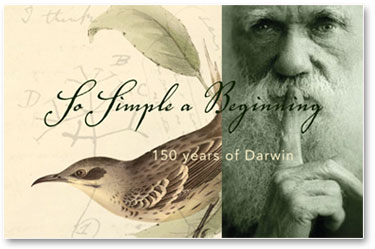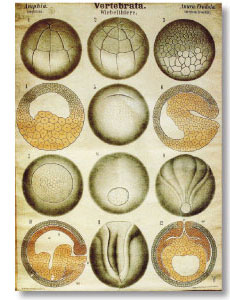UCI Libraries Fall Exhibit: 150 Years of Darwin
 On October 22, 2009, Francisco Ayala, UCI Donald Bren Professor of Biological Sciences, opened the Libraries’ fall exhibit with a talk titled “Darwin’s Gift to Science and Religion.” Professor Ayala highlighted some of the ideas found in Darwin’s On the Origin of Species by Means of Natural selection; or, The Preservation of Favoured Races in the Struggle for Life, and their influences on history and thought. This seminal book, published 150 years ago at the urging of friends and colleagues, made Darwin’s ideas the source of continuing speculation and discovery.
On October 22, 2009, Francisco Ayala, UCI Donald Bren Professor of Biological Sciences, opened the Libraries’ fall exhibit with a talk titled “Darwin’s Gift to Science and Religion.” Professor Ayala highlighted some of the ideas found in Darwin’s On the Origin of Species by Means of Natural selection; or, The Preservation of Favoured Races in the Struggle for Life, and their influences on history and thought. This seminal book, published 150 years ago at the urging of friends and colleagues, made Darwin’s ideas the source of continuing speculation and discovery.
“From So Simple a Beginning: 150 years of Darwin” shows how Darwin’s theory of the mechanisms that drive evolution challenged and influenced scholars, writers, artists, and scientists to rethink the relationship between man and animals. It also gave us a new way to view and understand the diversity of life on earth and how it can be perfectly adapted to so many unique niches.
In an attempt to convey the influences of this singular book, the exhibit provides a sampling of books and illustrations that show how natural selection moved from a brilliant theory to an accepted paradigm of modern biology. You learn about the initial reactions to the book by “Darwin’s Defender” Thomas H. Huxley, who debated and discussed man’s relationship to apes in his own work, Man’s Place in Nature (1863). The exhibit then moves to the popularization of evolution at the turn of the 20th century and the 1925 backlash that took the form of the Scopes Trial.
 Scientific discoveries brought a new understanding of evolutionary mechanisms as the “New Synthesis” or “Neo-Darwinism” came to the forefront of biological thinking. Biologists like John Haldane in The Cause of Evolution (1932) and Ronald Aylmer Fisher in The Genetical Theory of Natural Selection (1930) gave us new tools and helped turn evolution into a discipline. The main exhibit concludes with the discoveries in cell and molecular biology that have given us the modern-day understanding of some of the mechanisms of speciation.
Scientific discoveries brought a new understanding of evolutionary mechanisms as the “New Synthesis” or “Neo-Darwinism” came to the forefront of biological thinking. Biologists like John Haldane in The Cause of Evolution (1932) and Ronald Aylmer Fisher in The Genetical Theory of Natural Selection (1930) gave us new tools and helped turn evolution into a discipline. The main exhibit concludes with the discoveries in cell and molecular biology that have given us the modern-day understanding of some of the mechanisms of speciation.
Finally, the exhibit touches on how some of the implications of evolution have made us rethink what makes us human. Evolutionary ideas have influenced art, literature, business, and why we think and act as we do. As knowledge of our relatedness and differences has increased, a basic question remains: How much of our biology provides an ultimate explanation of human nature?
For more information, contact John Sisson, Research Librarian for Biology (jsisson@uci.edu or x44980).
Above left: “Cellular Development Diagram” Ernst Haeckel, artist. Visions of Nature: the Art and Science of Ernst Haeckel. Olaf Breidbach. London: Prestel, 2006. Microscopic studies of how cells developed and divided led to new insights into how genetic material might be tied to evolution.
Above right: Exhibit invitation, Sylvia Irving, Library Design Services

